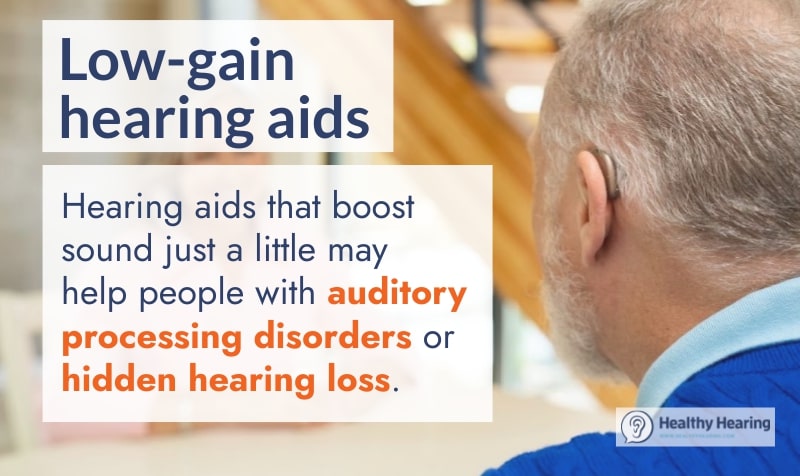|
www.HealthyHearing.com |
Should you try low-gain hearing aids?While they only amplify sound a little, they can make a big impact
Contributed by Madeleine Burry Low-gain hearing aids may be right for you, especially if you have auditory processing disorder or other hidden hearing loss. They are the same type of hearing aid you’d be fitted with if you were diagnosed with traditionally defined hearing loss, explains Christina M. Roup, associate professor and graduate studies chair at the Ohio State University department of speech and hearing science. The difference? They’re adjusted to provide less gain ("gain" means an increase in volume) than for someone with hearing loss, Roup says. Why? Aa small uptick in volume can make a meaningful difference if you have auditory processing disorder (APD), a condition that means your brain struggles to interpret and process sound.
Low-gain hearing aids can help with speech clarityThe impact of APD is similar to the three types of hearing loss: Difficulty hearing what people say, even though pure tone tests will reveal normal hearing thresholds. (More on testing in a moment.) With low-gain hearing aids, the gain is typically in the higher frequency range, Roup says. Fitting them this way gives people greater access to high frequency, low intensity sounds which “provides a lot of clarity to speech,” Roup says. The amplification may be minor, but it’s happening for key sounds which leads to greater speech understanding. Research backs up this usage: For adults with self-reported hearing difficulties (but normal pure-tone audiograms), low-gain hearing aids provided significant benefits, according to a 2018 study from Roup and the Ohio State University colleagues. And, they improve the signal-to-noise ratioBy boosting high frequency sounds, low-gain hearing aids also increase the signal-to-noise ratio, says Jessica Galatioto, an audiologist at ColumbiaDoctors and assistant professor of audiology in Otolaryngology at Columbia University Irving Medical Center. She provides a scenario to demonstrate why that’s meaningful: “Picture yourself sitting in a room where someone’s giving a lecture and there’s a lot of background noise.” Maybe there’s someone shuffling papers and ruffling through their bags, or there’s noise from the hallway, siren sounds sneaking in through the window, someone in a corner talking quietly on a cell phone, she says. Worse yet: Maybe there’s all of those background sounds occurring simultaneously. This is the noise. The signal—what you want to hear—is the person in the front of the room speaking. “So what happens is the background noise is actually louder than the signal sometimes,” Galatioto says. What you want is the reverse: for the signal to be louder than the background noise. The low-gain hearing aid helps accomplish that goal, improving the signal-to-noise ratio. Boosting the high frequencies and improving the signal-to-noise ratio give people “better access to the speech signal,” Roup says. Who else can benefit from low-gain hearing aids?People with hidden hearing lossLow-gain hearing aids also might be helpful with hidden hearing loss, which is named because it doesn’t show up readily on hearing tests. While hidden hearing loss is not well understood, it likely occurs because there’s damage in the cells that transmit sound between your cochlea and brain, per the American Academy of Audiology. Since those cells are damaged, your brain can’t fully receive the sound, or interpret it. Sometimes, Roup points out, a person's hearing exams don’t show hearing loss or signs of APD, “but they're still complaining about their hearing difficulty. So that's a group that I think low-gain hearing aids are really helpful for,” she says. People with tinnitus (aka ringing the in the ears) may also receive benefits from low-gain hearing aids. A pilot program from the Department of Veterans Affairs (VA) is looking into if low-gain hearing aids are helpful for people with tinnitus who don’t have hearing difficulties. For people who have both tinnitus and hearing loss, hearing aids are known to be helpful, per the American Tinnitus Association. They aren’t right for everyone with difficulty hearingThey’re not appropriate if you have significant, severe, or profound hearing loss, says Galatioto, an audiologist at ColumbiaDoctors and assistant professor of audiology in Otolaryngology at Columbia University Irving Medical Center. That’s because they only provide minimal amplification, she says. “There’s not a lot of volume coming out of the device,” she says. More: Degrees of hearing loss How to get low-gain hearing aids“Any audiologist that is in the practice of dispensing hearing aids can fit you with an appropriate hearing aid [for] your needs,” Galatioto says. That said, if you suspect you may have an auditory processing disorder, you may want to seek out an audiologist who frequently works with that clientele. That’s because a pure-tone audiogram — that’s the type of hearing test where you press the button when you hear a tone — may deliver normal results if you have ADP, Roup says. Other exams are needed to diagnose auditory processing disorder, and the testing can be a long process, Galatioto says. Avoid a temptation to self-diagnose with ADP or with hearing loss. There could be medical conditions causing you to have trouble hearing, Galatioto says. That’s why a proper diagnostic exam—with an audiologist or ENT—involving exams in a soundproof booth as well as someone looking in your ears is important, Galatioto says. That way, no underlying medical condition will be overlooked, she says. Are there downsides to low-gain hearing aids?Cost is a biggie: Hearing aids are a pricey item, which can make cost a barrier, Roup says. And, not everyone with an auditory processing disorder or difficulty hearing will benefit from low-gain hearing aids. “In my trial, not everyone experienced benefit,” Roup says. (Many states require retailers to accept returns on hearing aids for 30 days or more.) Other treatments are available for ADP, including auditory therapy, environmental adjustments, and compensatory strategies. “It's not going to be a one-size-fits-all treatment,” Roup says. That is, low-gain hearing aids may be helpful, or may not. Still: If you can hear, but not clearly, or there are some situations where you have trouble hearing, or really if there’s anything going on with your ears, get it checked out. “Hearing tests don't hurt. Come in get one. It's good for you,” Galatioto says. You can find a hearing center near you with our directory, and get this first step of diagnosis started today. Madeleine Burry
|
Featured clinics near me
Earzlink Hearing Care - Reynoldsburg
7668 Slate Ridge Blvd
Reynoldsburg, OH 43068

Find a clinic
We have more hearing clinic reviews than any other site!



 Madeleine Burry is a Brooklyn-based freelance writer and editor. She's written about health for several online publications, including Women's Health, Prevention, Health, Livestrong and Good Housekeeping. You can follow her on Twitter @lovelanewest.
Madeleine Burry is a Brooklyn-based freelance writer and editor. She's written about health for several online publications, including Women's Health, Prevention, Health, Livestrong and Good Housekeeping. You can follow her on Twitter @lovelanewest.